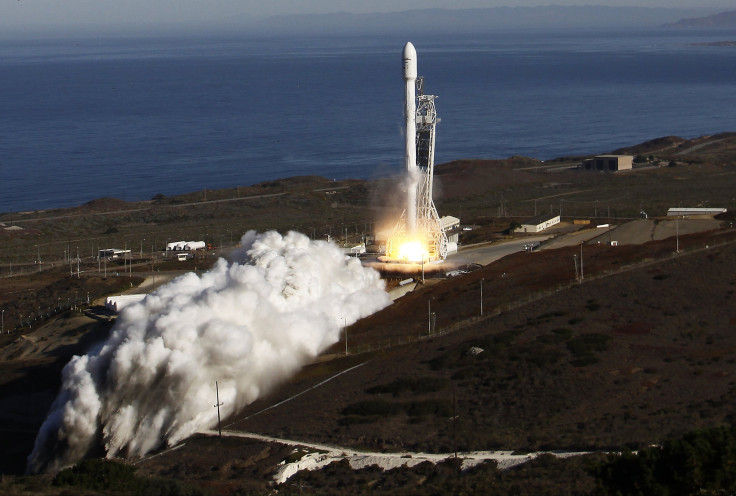Advantage Turns To SpaceX As US-Russia Relations Sour And Threaten Defense Dept. Launch Rocket Supply

Even before the downing of Malaysia Airlines Flight 17 over Ukraine last week, Space Exploration Technologies Corporation (SpaceX) was gaining ground in its fight to get a foothold in the lucrative Defense Department satellite launch business. The shootdown and the growing anger against Russia are likely to help the company.
With sanctions piling up against Russia, the Hawthorne, California, space cargo transporter could swoop in to help the Pentagon meet its payload-delivery needs if a vital supply of cheap Russian-made heavy rockets is hindered.
While the dispute between the two former Cold War rivals heats up, SpaceX is involved in its own showdown in the U.S. against Centennial, Colorado-based company United Launch Alliance (ULA) for the right to bid competitively on multibillion-dollar U.S. military contracts to send secretive payloads into space.
“It’s more likely now than before that SpaceX could win this fight,” said Rand Simberg, a space-business consultant and former aerospace engineer. “There’s certainly no question that the monopoly relationship between ULA and the government is probably coming to an end.”
Over the past 20 years, the U.S. has become dependent on a steady supply of $10 million RD-180 rocket engines manufactured by NPO Energomash, the 85-year-old manufacturer largely owned by the Russian government. These engines are used to deliver military satellites into orbit.
The U.S. uses between seven and 10 of these engines every year, according to comments made last week in remarks to Gen. William Shelton, head of Air Force Space Command that oversees Pentagon space missions. He told senators the U.S. currently has 15 engines in stock, or enough to last between 18 and 25 months at the current pace of missions.
NPO Energomash currently has orders to deliver more rockets, but the current row over Ukraine and the growing number of sanctions could hinder future transactions.
Sources in the industry who are watching the case closely told International Business Times on background that few believe the U.S. or Russia will move to block RD-180 deliveries, because Russia needs the money as much as the U.S. needs the engines.
But in May, Russian Deputy Prime Minister Dmitry Rogozin got the attention of the aerospace community by threatening to cut off the RD-180 supply in response to May's U.S. sanctions against Russian financial institutions. Rogozin's threats haven’t been carried out but they underscore the U.S. reliance on Russia for vital national security missions.
Currently the rockets are used in ULA's Atlas V launch vehicle. The company is a joint venture between leading aerospace giants The Boeing Company (NYSE:BA) and Lockheed Martin Corporation (NYSE:LMT). ULA said last month it has signed deals with U.S. companies to design and build a RD-180 replacement by 2019.
But SpaceX says it has a solution right now with its Falcon 9 rocket that could handle 65 percent of these military space missions. The company is suing the U.S. Air Force and the ULA for a right to competitively bid on them (pdf). ULA is currently the only company allowed to contract for 36 launches valued at $9.5 billion.
“This exclusive deal [between the U.S. Air Force and ULA] unnecessarily costs U.S. taxpayers billions of dollars and defers meaningful free competition for years to come,” SpaceX founder Elon Musk said in a statement in April. “We are simply asking that SpaceX and any other qualified domestic launch providers be allowed to compete in the EELV [Evolved Expendable Launch Vehicle] program for any and all missions that they could launch.”
The company founded in 2002 by billionaire inventor Musk plans to launch its Falcon Heavy vehicle next spring. SpaceX says it will be able to send up to 53 metric tons of payload into space, including stop-and-go movements that could deliver cargo to different orbits. The larger rocket would be able to handle the same payloads as either the RD-180 used by Lockheed’s Atlas V and the more expensive RS-68 that Boeing uses on its Delta IV launch vehicle.
But ULA disputes SpaceX’s capabilities, saying that Lockheed and Boeing have five decades of experience sending U.S. military payloads into space. Sending a billion-dollar satellite into orbit requires a great deal of deliberation, and the Air Force may be reluctant to move to a newer competitors even if, as Musk contends, the launches would cost less.
Earlier this week the Air Force sent a letter to Rep. Mike Rogers (R-Ala.), a member of the House Armed Services Committee, citing some “anomalies” with some of SpaceX’s missions, and saying those issues would need to be resolved.
Last month at the Farnborough Air Show in the U.K., Air Force Secretary Deborah Lee James said SpaceX would receive formal certification to launch national-security payloads sometime before the spring, but the company would not be able to bid on the 36 launches already given to the Boeing-Lockheed alliance. That covers all missions through at least 2017.
As relations between Russia and the United States continue to sour, the need for the U.S. to wean itself off Russian rocket technology is increasingly apparent -- regardless of its effect on a American corporate competition.
© Copyright IBTimes 2024. All rights reserved.






















